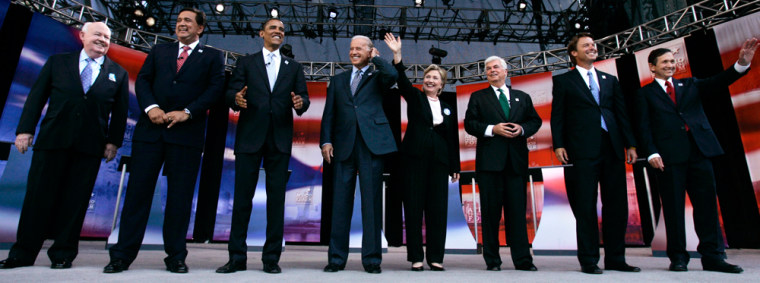The two front-runners in the Democratic presidential race vigorously defended themselves Tuesday against criticisms of their stands on terrorism and corporate influence, as their rivals struck at themes dominating the race in recent days.
At an outdoor debate before 15,000 union activists, New York Sen. Hillary Rodham Clinton took barbs for her ties to lobbyists and Wall Street.
The 90-minute debate, held at Soldier Field, was sponsored by the AFL-CIO. It was televised on MSNBC and moderated by Keith Olbermann (Click to watch the entire debate on msnbc.com).
"You'll never see me on the cover of Fortune magazine," said former senator John Edwards of North Carolina, a dig at Clinton, who recently was featured on the business publication's front.
Illinois Sen. Barack Obama said U.S. trade agreements have tilted against workers because "corporate lobbyists" have had too much influence, a theme he has developed in recent days, especially when alluding to Clinton.
Clinton smiled and replied: "The other campaigns have been using my name a lot."
"For 15 years, I've stood up against the right-wing machine," she said, as many in the crowd cheered. "If you want a winner who knows how to take them on, I'm your girl."
‘Musharraf is no Thomas Jefferson’
Obama also took hits. Connecticut Sen. Chris Dodd chided him for recently suggesting he would strike terrorist targets in Pakistan if he had information about the location of al-Qaida terrorists, even without the permission of President Pervez Musharraf.
"General Musharraf is no Thomas Jefferson," Dodd said, but he is an ally in the war on terror.
Clinton joined in, saying to Obama, "you should not always say everything you think when you are running for president, because it can have consequences."
Obama shot back: "I find it amusing that those who voted to authorize and engineer the biggest foreign policy disaster in our generation are now criticizing me."
Dodd, Clinton, Edwards and Delaware Sen. Joe Biden voted to authorize the Iraq war in 2002. Obama, who was in the Illinois legislature at the time, spoke out against the invasion.
Iraq, infrastructure addressed
At the debate's start, the candidates largely agreed that the nation should invest more money in infrastructure and less in the Iraq war, citing the Minneapolis bridge collapse as a symptom of neglect.
The candidates cast the matter as one of creating jobs as they addressed thousands of labor union activists, a constituency that could prove pivotal in deciding which contender emerges as the party's nominee.
"Putting our country back to work begins by cutting the funding for the war in Iraq," said Dodd, who added that $1 billion in domestic infrastructure spending would create 40,000 jobs.
Clinton said, "We have to make investments in infrastructure," adding that it would create jobs and improve security at ports, tunnels and other potential terrorist targets.
Several questions dealt with trade, a sensitive subject for union activists who argue that too many U.S. jobs have gone overseas.
Labor leaders often have criticized the 1993 North American Free Trade Agreement, which was enacted by former President Clinton, the New York senator's husband.
Hillary Clinton defended the pact, saying the nation needs "broad reform" of trade. "NAFTA is a piece of it, but it's not the only piece," she said. Obama and Edwards also stopped short of saying NAFTA should be scrapped.
China an ally?
All the candidates were asked whether China is an adversary or ally. The U.S. has a $233 billion annual trade deficit with the economic giant.
Most said they would take a tougher stand. "I do not want to eat bad food from China," Clinton said, alluding to recent incidents of tainted food imports.
Edwards reminded the audience of the 2 million lead-tainted toys from China that were recalled last week.
Several of the candidates said their hearts and prayers were with the six trapped coal miners in Utah.
Both Clinton, who grew up in the Chicago suburbs, and Obama alluded to the debate locale -- Soldier Field where the Bears play football. Clinton said her father, a lifelong Bears fan, would marvel at the idea of one of his children standing on the 10-yard line.
Obama, a former Illinois lawmaker, defended his support for the renovation of Soldier Field and the use of money that could have been spent on infrastructure, citing the jobs created.
Gravel a no-show
Seven of the eight contenders shared a covered stage at Soldier Field in 90-degree heat. Former Alaska Sen. Mike Gravel, who did not complete the required AFL-CIO questionnaire, did not plan to attend.
The AFL-CIO's executive council will meet Wednesday to decide whether to begin the labor federation's endorsement process immediately or wait.
The AFL-CIO, the nation's largest federation of labor unions, didn't endorse a candidate in the 2004 primary. Its rules say two-thirds of the AFL-CIO's individual unions must agree on a candidate before an endorsement, and that didn't happen.
The last two AFL-CIO primary endorsements went to former Vice President Al Gore in 2000 and Walter Mondale in 1984.
If the executive council doesn't begin its endorsement process — the result most observers expect — individual unions will be free to endorse whoever they want.
The AFL-CIO — which has 55 member unions and represents 10 million workers — said in 2006 that it knocked on 8.25 million doors for union candidates, made 30 million telephone calls, distributed 14 million fliers and sent out 20 million pieces of mail.
